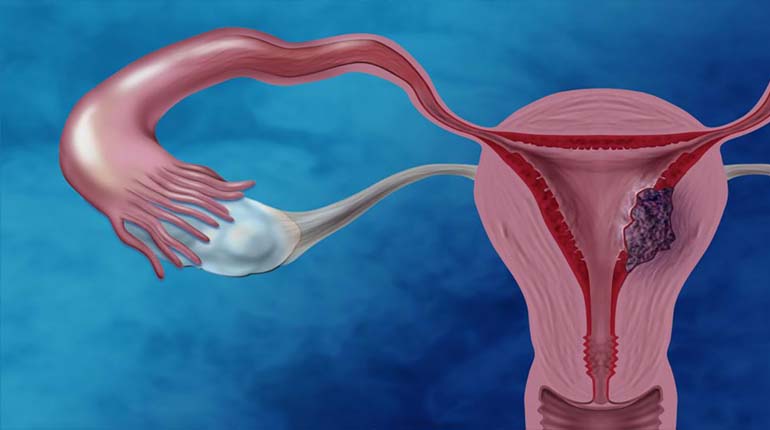
When abnormal cells in the ovary begin to multiply and eventually form a tumor, it is referred as ovarian cancer or the cancer of the ovary.
Ovaries are two almond-shaped egg-producing female reproductive organs, one on each side of the uterus. It includes the fallopian tubes, uterus (womb), cervix, vulva and vagina.
Ovarian cancer can develop in one or both ovaries and if left untreated, the tumor can spread to the surrounding tissues and other parts of the body, called metastatic ovarian cancer.
Cancer of the ovary is one of the most common cancers found in women. Also, it is the most common cause of gynecologic cancer deaths globally.
Exact causes of ovarian cancer are still not clear, though there are certain factors that can increase the risk of the disease.
In general, cancer begins when a cell develops mutations in its DNA which in return prompt cells to grow and multiply quickly, creating a tumor of abnormal cells.
The symptoms of ovarian cancer are often subtle, and they may mimic common digestive issues. Perhaps the reason, ovarian cancer often gets diagnosed at the later stage.
Early stage ovarian cancer rarely causes any symptoms, but as the disease progresses, it causes a few nonspecific symptoms that are often mistaken for more common conditions.
Other possible symptoms of ovarian cancer can include shortness of breath, tiredness, leg swelling, and pain in the abdomen or pelvis.
Ovarian cancer starts from the outer lining or epithelium of the ovary. Among many unknown factors, a few that can increase your risk of ovarian cancer include:
1) Age: Ovarian cancer can occur at any age but is most common in women over 50 years and the ones who have stopped menstruating.
2) Inherited faulty genes: Ovarian cancers are caused by gene mutations called breast cancer gene 1 (BRCA1) and breast cancer gene 2 (BRCA2). These mutated genes also increase the risk of breast cancer among women.
3) Family history of cancer: People with family history of ovarian cancer have an increased risk of the disease. Also, the risk is higher in women diagnosed with breast cancer, uterine cancer or bowel cancer at a young age.
4) Lifestyle factors: The risk of ovarian cancer is more if you smoke. Infact the longer you have smoked, the greater is the risk. Also, having excess body fat is linked to an increased risk of getting ovarian cancer.
5) History of endometriosis: It’s a condition in which tissue from the lining of the uterus grows outside of the uterus.
Stage I: During ovarian cancer stage 1, the cancer is confined to the ovaries and hasn’t spread to the abdomen, pelvis or lymph nodes, or to the distant sites.
Stage II: The cancer at this stage is present in one or both ovaries and has spread to the pelvic region, such as the fallopian tubes or uterus.
Stage III: The cancer at this stage is present in one or both the ovaries. Also, it has spread beyond the pelvis to the lining of the abdomen or to the lymph nodes.
Stage IV: During this advanced stage, the cancer has metastasized to the distant sites, such as the inside of the spleen, liver, lungs or other organs outside the abdomen and pelvic region.
Like many other cancer types, ovarian cancers are also named after the cell type from which they originate. These include: epithelial, germ cell, and stromal.
These three types of cells make up the ovary and each cell type develops into a different type of tumor. Also, each type has its own characteristics, which includes how it spreads, how it’s treated and it’s prognosis.
While most women diagnosed with ovarian cancer are over 50-55 years, it is found in younger women, too. Dr. Roshan Koshy Jacob is specialist for ovarian cancer in nagpur, He will properly diagnosing and treating ovarian cancer. We understand being diagnosed with cancer can get overwhelming, but with treatment, there is hope.